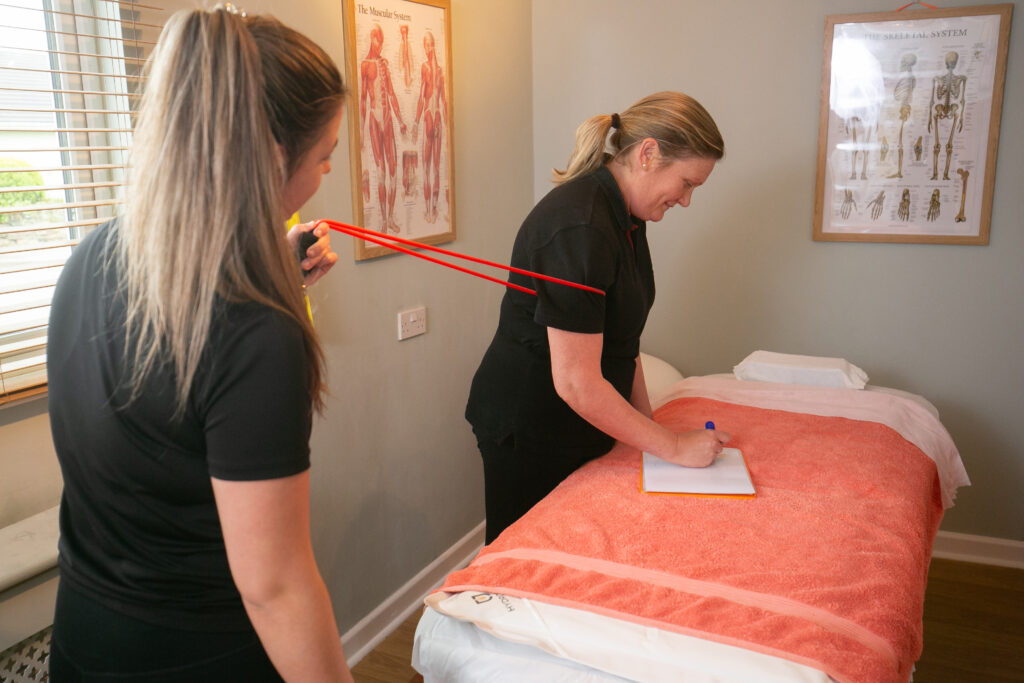Our Sports Therapist Lauren on Rehabilitation
Our Sports Therapist in Truro, Lauren has been qualified in Sports Therapy since 2017. Here she lets us into her journey as a Sports therapist, her passion for exercise rehabilitation and why she applies a person centred, fun approach to rehabilitation.
They often say that when you’re in training at university you learn lots of things, but you don’t properly start learning until you experience life and work in the real world. I completely agree with this!!
Lauren Lyndon Hill Sports Therapist BSc MSc. STO member
My journey
My journey as a sports therapist began because from a very young age. I experienced knee and elbow pain on a regular basis. After many journeys to the hospital, undergoing various assessments and testing I was diagnosed with Juvenile arthritis. When undergoing various assessments, and even at a young age I asked questions on what they were testing and why they were testing for it.
Experiencing pain ( & I still do), I became very interested in the rehab process. The treatment I received regularly meant that I could continue being a normal child. I was always told as a child that I couldn’t do sport if it caused me pain. Me being me, I always pushed the boundaries which meant I would always be paying for it later with pain.
I’m not going to lie, when I was younger did I ever listen to my body?… No, I often pushed myself too much! Did I ever do all my rehab when I was younger?… Again, no I didn’t because it was repetitive and boring!
However, from these experiences I began to have a love of interest for pain, anatomy, rehabilitation and sport. Putting all these subjects together is where I found my love to become a sports therapist.
The reason I told this story was because exercise rehabilitation can sometimes be a bit boring, and we may not always adhere to things we perhaps should!! I have worked with adolescents for the past 5-6 years. Working with adolescents made me realise that making rehabilitation fun is a very important aspect. As well as the communication we use.
Working in a clinical environment at Keheren Therapy, I noticed that sometimes giving rehabilitation programs to adults, not everyone will adhere to the plan for various reasons. I then began to think about how I could change this so that adults are more likely to complete the rehabilitation process and able to adhere to injury rehabilitation much better.

My approach to injury rehabilation
For me now being on the other side as a sports therapist, I feel it is important to help and support our patients as much as we can throughout the rehabilitation process. Here are the strategies I have learnt through a combination of education, my own experiences with pain and simply from working daily in the real world with patients:
- Both the therapist and patient forming a good bond and relationship. Therapist’s listening to you and getting clear honest information and sharing goals together. Working together to achieve those goals. For example, If you enjoy gardening then why not add it into your rehabilitation process? Does you’re rehabilitation program fit into your lifestyle? There are so many ways of adapting it to suit YOU! This is your way of feeling empowered and in control of your rehabilitation as a patient.
- It’s very important to maintain the social aspect in your work, hobbies and/or sport. As a therapist, I try to ensure that you stay involved within your sport, work or daily life environments. For example, as a patient can you still attend and support you’re team and maybe even complete some sport specific rehab? If your job is physical and you can’t work because of injury, can you adapt you’re work and work in any other way? If you love gardening, can you adapt you’re gardening and still stay involved with it?
- It is important to set goals realistically. This will help to shape your rehabilitation. Remember that they are YOUR goals, with support and guidance from you’re therapist. Working as a team with your therapist is so important! Can you think outside the box and give yourself different types of goals? For example…do you want to restore strength and mobility? Do you want to improve on sleep? Could it be you want to stay involved within you’re team?
- As a patient, it is imperative to ensure you are actively involved within your own treatment and rehabilitation. This gives the patients the option to delegate the decision-making process. As briefly mentioned, this is where it is vital for you to have a good relationship with you’re therapist. For example, when you feel you can be honest and share important information with your therapist, this will help you to adhere to rehabilitation and achieve better results!!
I hope this article has helped all my patients new and old from my perspective and experiences of being both as a therapist and as a patient within injury rehabilitation!!
To contact Lauren email Lauren@keherentherapy.co.uk

